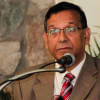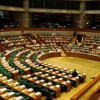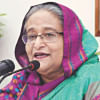The chronicle of failed dialogues
Prime Minister Sheikh Hasina, who wrapped up weeklong dialogues with political parties on the next parliamentary polls yesterday, had been part of the eventful history of both successful and failed talks.
Records of talks held in around last three decades since the restoration of democracy in the country show that crisis was resolved and political situation improved whenever dialogues between political parties became successful.
However, whenever talks collapsed, it had disastrous consequences. On every occasion, the dialogue results cost the country's people, economy and democracy dearly. It happened between 1994-96, in 2006 and 2013.
Opposition parties led by Hasina had launched vigorous street agitations twice while those led by BNP Chairperson Khaleda Zia took to the streets in 2013.
As the top leaders of the Jatiya Oikyafront, an alliance of BNP and several other political parties, were not happy with the outcome of their second round of dialogue with the PM yesterday, it will hold a rally in Rajshahi tomorrow.
After the fall of autocratic ruler Gen HM Ershad in 1990, the first successful talks among the political parties paved the way for a smooth transition to democracy. They reached an agreement and requested then chief justice Shahabuddin Ahmed to lead the interim government after Ershad's resignation as president.
The Shahabuddin government was successful in leading a peaceful transition to democracy through holding a free and fair national election in February 1991. Parliamentary democracy was restored in the country.
There are other instances of holding successful talks back then.
But only four years after the restoration of democracy, the political parties failed to resolve a deadlock through talks.
From September 1994 to January 1996, the country's eminent citizens, foreign dignitaries, including a special envoy of the then Commonwealth secretary general and diplomats in Dhaka, mediated a series of negotiations between the then ruling BNP and the opposition AL to resolve the political crisis over the introduction of an election-time government.
As the negotiations failed, the country witnessed a massive street violence and eventually a one-sided parliamentary election in February 1996. The polls were boycotted by the AL and its allies who had been agitating for the introduction of a nonpartisan caretaker government system.
In 2004, a political crisis developed over increasing the retirement age of Supreme Court judges through a constitutional amendment. The amendment paved the way for then chief justice KM Hasan to become the chief adviser of the election-time caretaker government.
Under the leadership of Hasina, the then AL-led opposition alliance strongly rejected the amendment saying they would not accept Justice Hasan as the chief adviser.
Towards the fag end of its five-year tenure, the BNP-led government agreed to sit for talks with the AL to break the political deadlock. Then BNP secretary general Abdul Mannan Bhuiyan and AL general secretary Abdul Jalil held several rounds of talks at the Jatiya Sangsad Bhaban. But the talks failed to resolve the crisis.
The tenure of the BNP government came to an end with the crisis remaining unresolved. There was violence in the street.
Then president Iajuddin Ahmed opened talks with political parties to end the impasse.
The BNP rejected the AL's proposal for finding an alternative to Justice Hasan. All of a sudden, Iajuddin, on the BNP's advice, assumed the office of the chief adviser, ignoring the constitutional provision. The crisis worsened further.
At one stage, the AL-led alliance pulled out of the national election scheduled for January 22, 2007, and intensified street agitation. The party announced that it would resist the election. The country plunged into political chaos resulting in the declaration of the state of emergency on January 11.
The crisis over the election-time government prevailed in 2011 when the AL government, led by Hasina, abolished the caretaker government system by amending the constitution.
The constitutional amendment not only allowed the AL to stay in power during the national election, but also allowed all lawmakers to seek re-election staying in office.
This time, the BNP-led alliance, under the leadership of Khaleda, took to the streets demanding restoration of the caretaker government system. The AL rejected the demand. A political deadlock continued in the country with an escalation in violence.
Early in December 2013, the United Nations sent its key official Oscar Fernández-Taranco to Dhaka for a four-day visit to discuss with political leaders a mutually acceptable formula to hold an “inclusive, non-violent and credible” election.
He held several rounds of talks with AL and BNP leaders. But the dialogues failed to break the deadlock, resulting in a one-sided parliamentary election in January 2014.
Timeline: failed talks
1994-1996: Crisis over introduction of caretaker government
Sept 26, 1994: Prime Minister Khaleda Zia and Opposition leader Sheikh Hasina formally agree to hold talks mediated by Commonwealth Secretary-General Emeka Anyaoku
Oct 2, 1994: Sheikh Hasina told Emeka Anyaoku: "Awami League is ready to sit in dialogue but the government is not cordial to create the environment for talks."
Oct 5, 1994: Commonwealth secretary-general nominates Sir Ninian Stephen as his special envoy to mediate dialogue. Emeka Anyaoku meets PM Khaleda Zia
Oct 13, 1994: Sir Ninian Stephen arrives in Dhaka
Oct 25, 1994: The much-talked about dialogue between government and opposition fails
Oct 31, 1994: Sir Ninian Stephen requests Sheikh Hasina not to announce final programme for agitation for the sake of dialogue
Nov 12, 1994: Clash between AL and BNP in Natore leaves 3 bullet-hit
Dec 28, 1994: MPs of AL, Jatiya Party, NDP, Jamaat-e-Islami resign en-mass from parliament
Feb 18, 1995: Opposition turns down Prof AQM Badruddozza Chowdhury's proposal for dialogue
Sep 4, 1995: US Assistant Secretary of State Robin L Raphel arrives in Dhaka
Sep 5, 1995: Robin Raphel holds meeting with Hasina and other political leaders
Sep 7, 1995: Robin Raphel meets Khaleda
Sep 16, 1995: 72-hour hartal enforced by opposition AL begins
Oct 16, 1995: 96-hour hartal enforced by opposition AL begins; two killed
Oct to Nov, 1995: Five eminent citizens including Rehman Sobhan and Barrister Ishtiaq Rahman meet with Khaleda and Hasina several times to break the political standoff
Jan 16, 1996: Ambassadors and High Commissioners of the US, UK, Japan, Canada, Australia and Italy hold meeting with Hasina and Khaleda
Feb 15, 1996: Sixth parliamentary elections held without opposition party
2006-2007: Crisis over appointment of chief adviser of caretaker government
July 13, 2006: Businessmen seek dialogue between BNP and Awami League
Sep 5, 2006: PM Khaleda Zia at a rally in Noakhali: "There are many political parties which will participate in the election regardless of whether the opposition party takes part in the polls."
Sep 6, 2006: Awami League led 14-party besieges Election Commission. Dhanmondi turns into battlefield.
Sep 14, 2006: PM Khaleda calls upon two secretary generals of BNP and AL to sit in dialogue
Sep 18, 2006: Opposition leader Sheikh Hasina at a rally in Paltan: "Dhaka will be paralysed if [former] Justice KM Hasan takes over as chief of caretaker government. Come to Dhaka with whatever belongings you have."
Oct 4, 2006: PM Khaleda asks to reach consensus immediately. Opposition leader Sheikh Hasina says: "Caretaker government might be formed in line with the constitution, but no Hasan. Accept people's demand."
Oct 5, 2006: Reform-dialogue begins. AL General Secretary Abdul Jalil hands over 21-point proposal to BNP Secretary General Abdul Mannan Bhuiyan.
Oct 10, 2006: Dialogue suspended until October 16.
Oct 25, 2006: PM Khaleda Zia's address to the nation: "There is nothing to be disappointed about if dialogue fails. The constitution is the safeguard."
Oct 25, 2006: BNP Secretary General Abdul Mannan Bhuiyan declares that it is not possible to reach consensus without KM Hasan.
Oct 27, 2006: Oath taking ceremony suspended as Justice KM Hasan "falls sick".
Oct 28, 2006: Former Chief Justice KM Hasan
declines to head the caretaker government "in the interest of the people."
President Iajuddin Ahmed expresses his willingness to assume the role of chief adviser at a meeting with BNP, AL and other political parties. AL rejects the
proposal outright.
At least 12 people were killed and about 2,000 wounded in an escalation of violence across the country.
PM Khaleda Zia urges opposition to accept whatever decision the president takes on caretaker chief.
Opposition leader Sheikh Hasina says the president should follow the constitution.
Nov 15, 2006: Khaleda Zia: "Constitution must be upheld at any cost."
Nov and Dec , 2006: A diplomatic circle known as "Coffee Group" holds meeting with different political parties including AL and BNP
Jan 10, 2007: United Nations Secretary General Ban Ki-moon issues a statement calling on all sides to compromise and refrain from violence
Jan 11, 2007: President Iajuddin Ahmed resigns from post of chief adviser declaring a state of emergency in the country
2013: Crisis over restoration of caretaker government
May 10, 2013: A five-member UN delegation led by Oscar Fernández-Taranco, assistant UN secretary-general for political affairs, arrives in Dhaka
May 11, 2013: Taranco holds meeting with PM Sheikh Hasina and Khaleda Zia, urging them to reach a consensus on holding a free and fair national election
May 12, 2013: Taranco meets Speaker Shirin Sharmin Chaudhury
Nov 30, 2013: 3 killed on the first day of 72-hour blockade
Dec 4, 2013: Indian Foreign Secretary meets Hasina, Khaleda and HM Ershad
Dec 6, 2013: Five-member UN team, including Taranco, arrives in Dhaka
Dec 7, 2013: Taranco meets Hasina and Khaleda
Dec 8, 2013: Taranco meets JP Chief Ershad, CEC Kazi Rakibuddin Ahmed and PM's adviser Gowher Rizvi
Dec 10, 2013: AL and BNP sit in a meeting to discuss crisis
Dec 11, 2013: UN Secretary General Ban Ki-Moon calls PM Hasina over phone
Dec 12, 2013: JP Chief Ershad has been picked up
Dec 13, 2013: 128 MPs elected uncontested
Ban Ki-Moon calls the President
AL and BNP sit for third time to end political crisis
Dec 17, 2013: 72-hour blockade begins
Dec 24, 2013: BNP Chair Khaleda urges people to march towards Dhaka from every corner of the country
A cop killed in arson attack in bus; AL MP among 15 hurt in clash
Dec 26, 2013: Bomb attack on cops again, 1 killed in Rajshahi
Dec 30, 2013: British High Commissioner Robert Gibson meets Khaleda
Jan 1, 2014: Non-stop blockade starts
Jan 3, 2014: 2 dead, 8 burnt in blockade
Jan 5, 2014: 10th general election held amid intense localised violence leading to at least 18 deaths



 For all latest news, follow The Daily Star's Google News channel.
For all latest news, follow The Daily Star's Google News channel. 








Comments